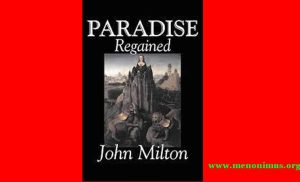Paradise Regained | John Milton | A Review
Paradise Regained John Milton A Review
John Milton’s Paradise Regained-A Review
“Paradise Regained,” penned by the renowned English poet John Milton, is a profound and lesser-known sequel to his magnum opus “Paradise Lost.” This epic poem, published in 1671, may not have garnered as much attention as its predecessor, but it still stands as a remarkable work of literature, displaying Milton’s mastery of language, theology, and philosophy.
Context and Structure:
“Paradise Regained” is composed of four books and comprises approximately 2,600 lines. In contrast to the sprawling narrative of “Paradise Lost,” Milton adopts a more focused and condensed approach. The poem revolves around the theme of temptation and centers on the biblical story of Christ’s forty days in the wilderness, where he is tempted by Satan. This sharp thematic focus sets it apart from the grand scale of its predecessor.
Language and Style:
Milton’s command over language shines in “Paradise Regained.” His use of blank verse, a hallmark of his writing, remains as impressive as ever. The lines are rich in imagery, metaphors, and allusions, showcasing his deep knowledge of classical literature and biblical texts. His language elevates even mundane actions into moments of profound contemplation.
Theological Depth:
The poem delves into intricate theological debates, with Christ engaging in intellectual discourse with Satan. These dialogues explore themes of power, sacrifice, and the nature of divinity. Through these conversations, Milton portrays Christ as intellectually astute, unwavering in his commitment to righteousness, and fully aware of his divine purpose.
Characterization:
Satan’s characterization in “Paradise Regained” differs from that in “Paradise Lost.” In this sequel, Satan is less bombastic and more subtle in his temptations. He uses logic and persuasion, aiming to exploit Christ’s human nature. Christ, on the other hand, is depicted as serene and steadfast, maintaining a sense of inner peace even in the face of temptation.
Themes:
The central theme of “Paradise Regained” is the triumph of the human spirit over worldly temptations. Milton explores the concept of spiritual regeneration and emphasizes the idea that true power lies in self-mastery and submission to divine will. The poem encourages readers to resist the allure of material gains and instead seek higher, spiritual truths.
Reception and Significance:
“Paradise Regained” initially received mixed reactions from critics and readers who were more accustomed to the grandeur of “Paradise Lost.” However, modern literary analysis has reevaluated the poem’s significance. Its exploration of inner strength, the battle of principles, and the value of spiritual resilience remain relevant to contemporary discussions on ethics and personal growth.
Influence on Literature:
While “Paradise Regained” might not have enjoyed the same level of popularity as its predecessor, it still left its mark on subsequent literary works. Its philosophical debates and profound musings on the human condition have inspired writers, theologians, and thinkers for centuries. It also adds a new layer of depth to the understanding of Milton’s theological and philosophical beliefs.
“Paradise Regained” is an intellectual tour de force that showcases Milton’s linguistic prowess and deep engagement with theological concepts. While not as expansive as “Paradise Lost,” it offers a tightly woven narrative with dialogues that explore profound themes of temptation, virtue, and spiritual strength. This lesser-known masterpiece deserves recognition for its contribution to the literary and philosophical landscape. 0 0 0.
Paradise Regained John Milton A Review
You May Like: The Satanic Verses by Salman Rushdie-A Review
N. B. The article ‘Paradise Regained John Milton A Review’ originally belongs to the book ‘The Reviews of Epic Literature Around the World Vol-I‘ by Menonim Menonimus.








